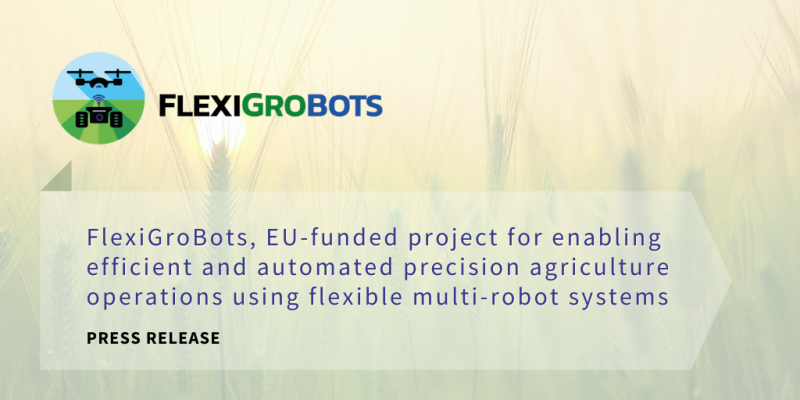
FlexiGroBots, EU-funded project for enabling efficient and automated precision agriculture operations using flexible multi-robot systems
The project focuses on the development of a novel platform for building mission control of heterogeneous multi-robot systems which will be validated of three real-life scenarios: grapevines, rapeseeds, and blueberries.
Madrid, Spain. March 22, 2021. Coordinated by the Research and Innovation hub of the Atos Group in Spain, FlexiGroBots project started officially on the 1st of January of 2021 funded by the European Commission under the Horizon 2020 Programme within the topic of robotics for agri-food and agile production which envisioned the establishment of large-scale pilots, addressing both technical and non-technical issues, such as socio-economic impact, novel business models, ethical issues, and connections to AI, Big Data and IoT.
The adoption of novel technologies by the agriculture sector has increased in the past years, unleashing a new paradigm – Agriculture 4.0. Within it, robotics, AI and automation play a major role in crop production and precision agriculture operations, optimising resources based on relevant data. Nevertheless, there is a gap between the installed and the real performance of different types of robots used for specific tasks.
FlexiGroBots project will run for 36 months with the main objective of creating and validating its open platform for flexible heterogeneous multi-robot systems including Unmanned Aerial Vehicle (UAVs) and Unmanned Ground Vehicle (UGVs). The platform will integrate existing technology platforms and components provided by various digital transformation initiatives and ecosystems, for addressing the most imperative needs of the Agriculture sector in terms of multifunctional robots, multi-robot cooperation, autonomy and awareness, and actionable data.
Through the FlexiGroBots platform, the project aims to empower roboticist, engineers, and service providers to build and deploy flexible heterogeneous multi-robot systems in the Agri-Food sector, while also providing various benefits to farmers around the world:
- Versatility for using the same robots for different observation and intervention tasks throughout the crop life cycle
- Cooperation between ground and aerial robots for more complex missions
- Relevant data to power AI-driven agricultural operations
- Autonomy for real-time adaptation of mission plans and robots’ behaviour at crop level
- Precision in agricultural operations to carry out accurate tasks, hence reducing costs and environmental footprint
Furthermore, the platform foresees an agricultural data space integrating a set of common data services to enable data collection and integration, publication and sharing, and security and trust, following the International Data Space Association reference architecture, and considering also data coming from geospatial data platforms such as Copernicus and Information Access Services (DIAS).
The FlexiGroBots platform and its different components will be demonstrated and validated within three real-life pilots of significant economic value, posing different levels of complexity regarding crops, number and types of robots used from one side, and varying levels of complexity in relation to geographical regions, weather conditions and national regulations, on the other.
- Grapevines (Spain): Demonstrate the high capacity and versatility of robots to carry out different tasks in vineyards, contributing to the economic profitability and quality of grapes for wine production.
- Rapeseeds (Finland): Demonstrate time-critical pest management and robotization of heavy machinery fleets in grassland management.
- Blueberries (Serbia and Lithuania): Demonstrate the potential of novel robotic solutions for blueberry farming supported by advanced remote sensing, deep learning, and decision-support techniques.
FlexiGroBots brings together a multidisciplinary consortium composed of 16 different organisations and companies, from 8 different countries, with different areas of expertise that makes it possible to build the platform and its services, define the validation roadmap and activities on the three scenarios, and outline the go-to-market and sustainability plan for the expected results. The project will also provide a consolidated report on ethical AI in Agri-Food based on the lessons learned throughout the execution of the project.
The partners are Atos (Spain), Spanish National Research Council – CSIC (Spain), Seresco (Spain), Bodegas Terras Gauda (Spain), Centre for European Policy Studies -CEPS (Belgium), Wageningen University & Research (Netherlands), International Data Spaces Association – IDSA (Germany), BioSense Institute (Serbia), Zeleni hit (Serbia), Art 21 (Lithuania), AgriFood Lithuania, Agrosmart (Latvia), Probot OY (Finland), Natural Resources Institute Finland – LUKE (Finland), VTT Technical Research Centre (Finland), and MTECH Digital Solutions (Finland).
Quote:
“FlexiGroBots will enable farmers, farmer associations and the agriculture industry to use multi-robot systems for intelligent automation of farm operations, increase farm production efficiency and economic sustainability. On top of that, the project will also benefit Digital Innovation Hubs (DIHs) throughout Europe, which are specialized in robotics, agriculture and associated fields, as well as innovation developers and agriculture service providers including SMEs working in close cooperation and proximity to farmers” Daniel Calvo Alonso, Head of the AI, Data & Robotics Unit at Atos Research and Innovation, and FlexiGroBots Project Coordinator.